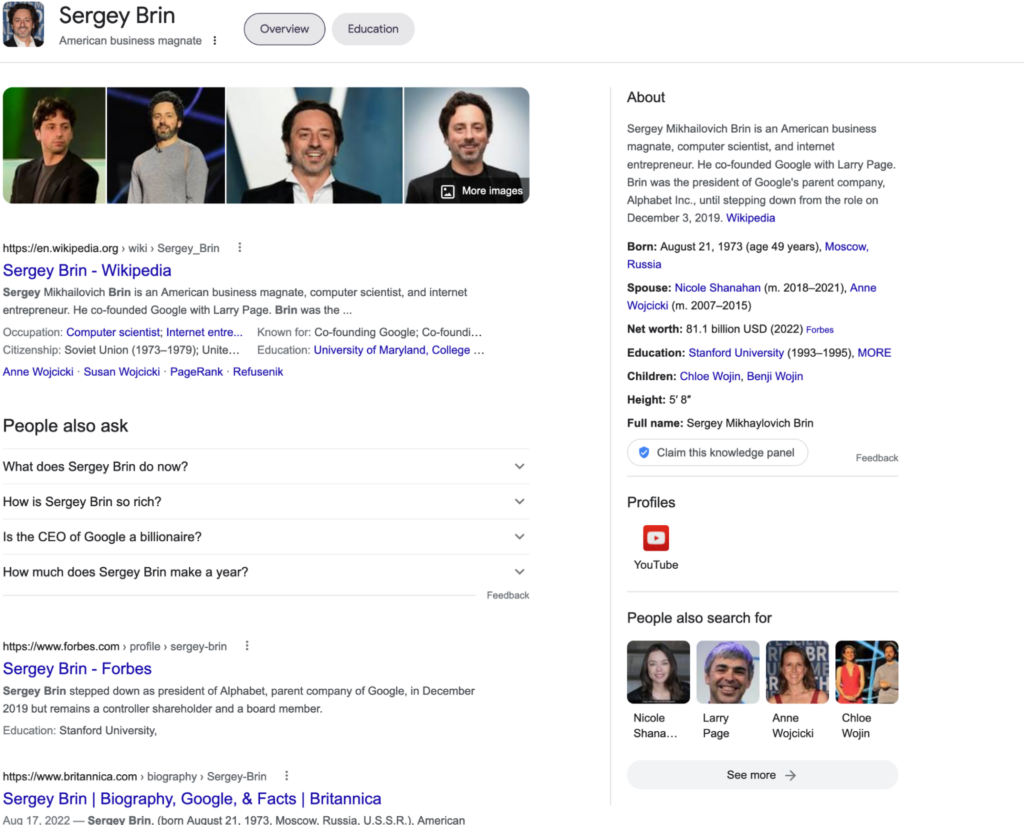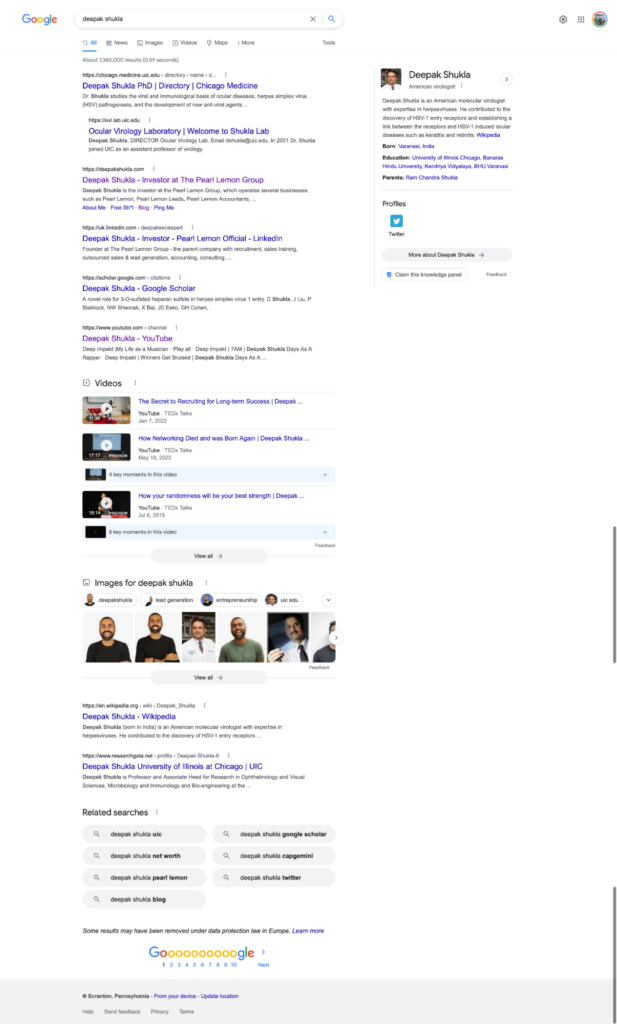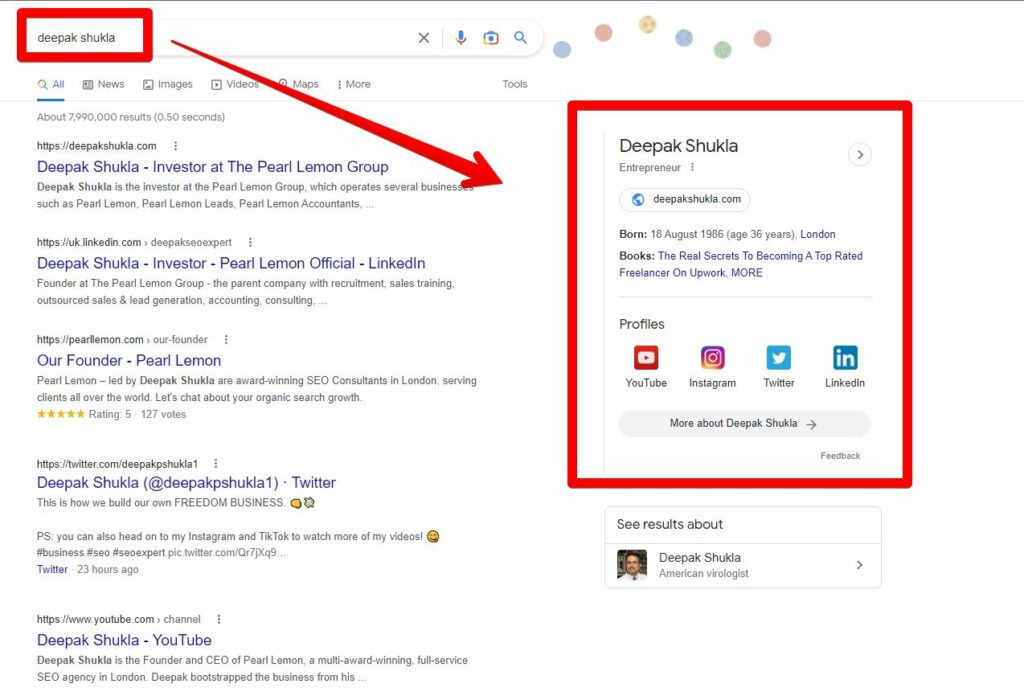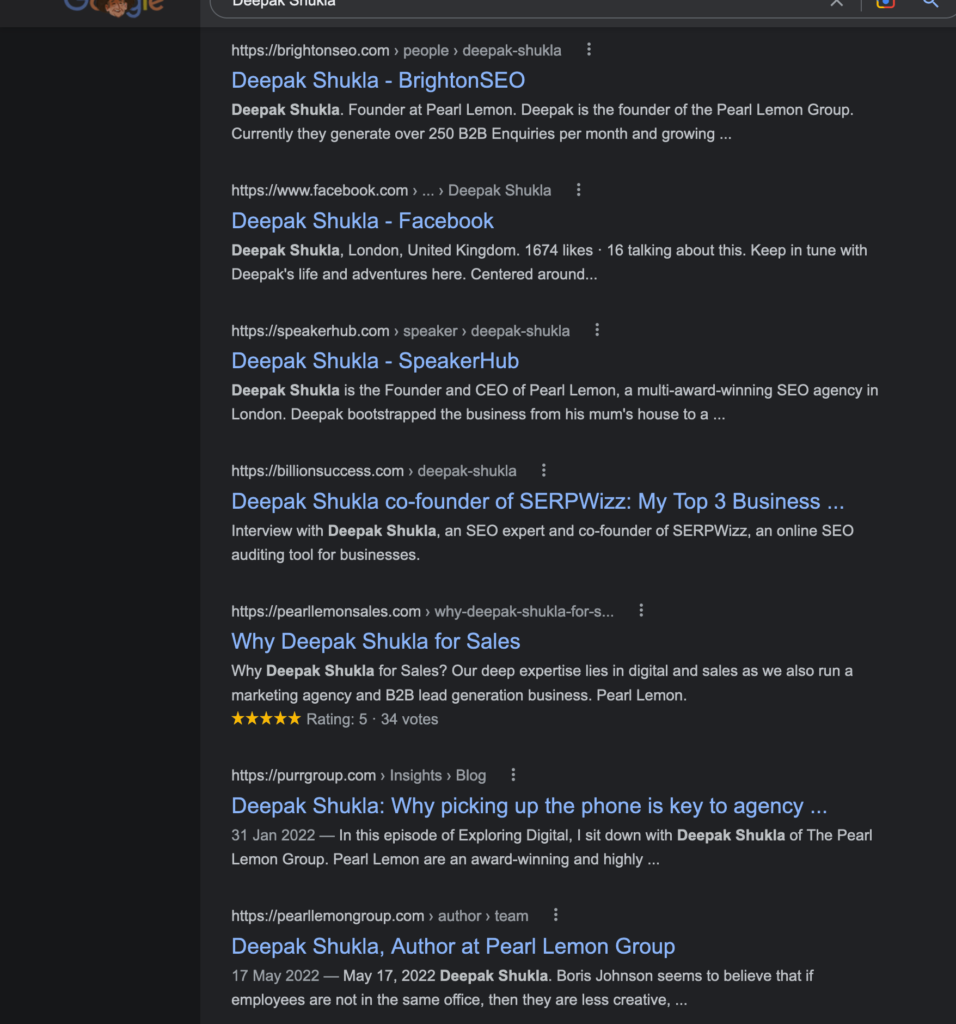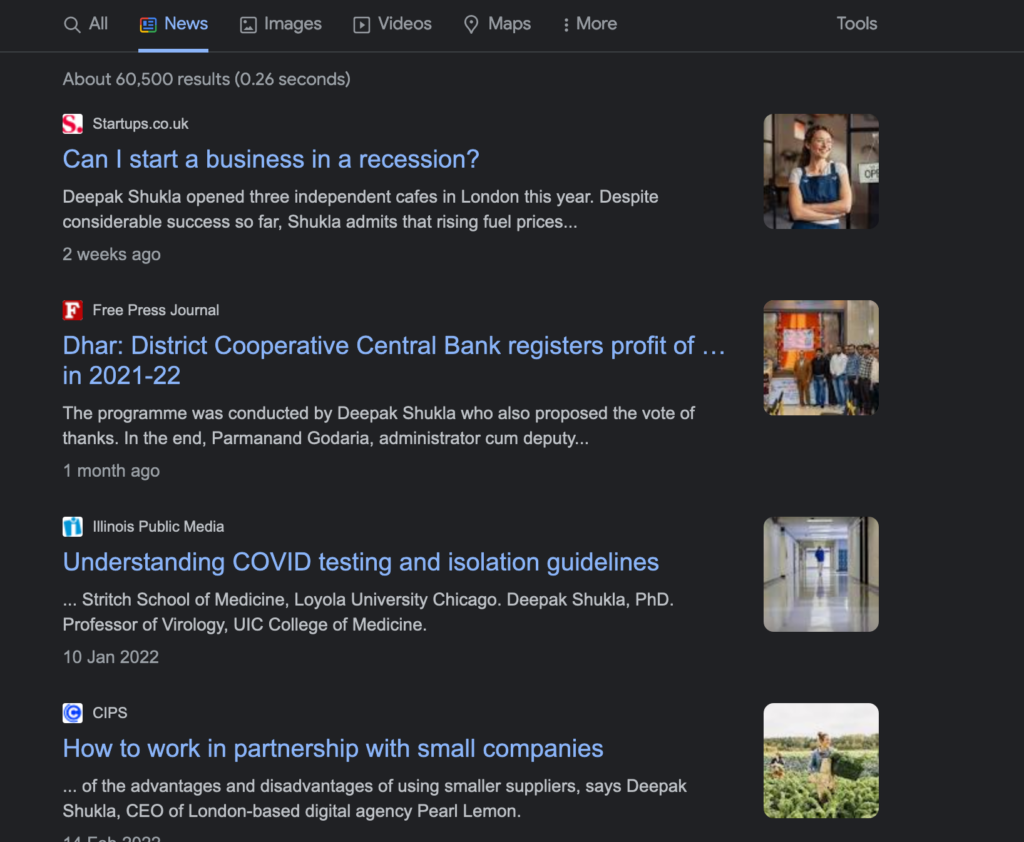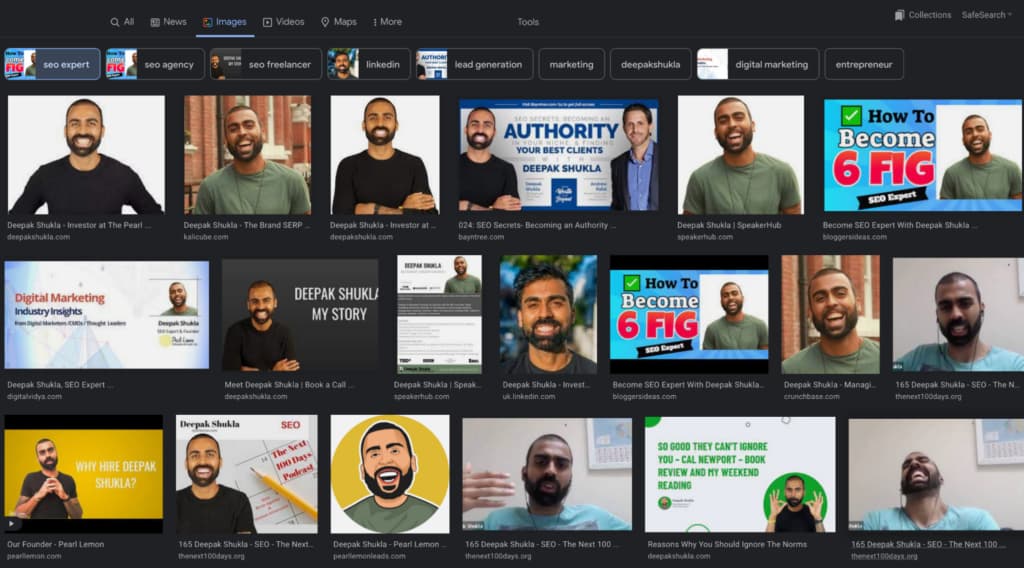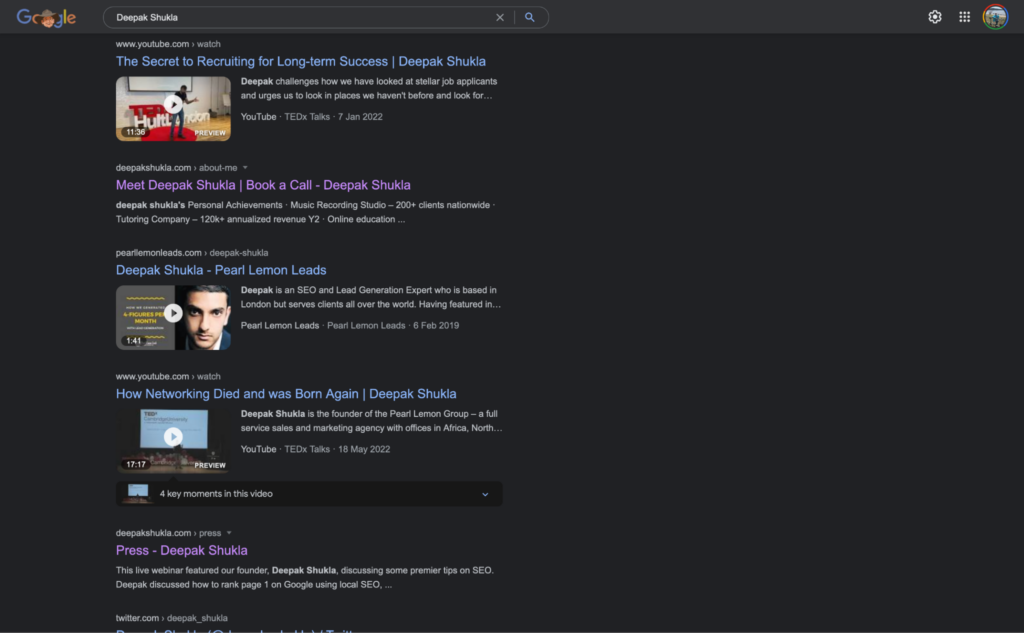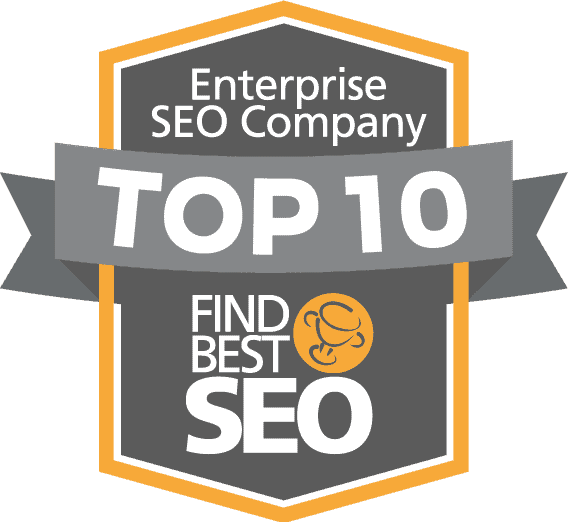Where is the Google Knowledge Panel Displayed?
What is Contained in a Google Knowledge Panel?
Where Do Google Knowledge Panels Come From?
How Does Google Decide Who or What Gets a Knowledge Panel?
The Problem with Google Knowledge Panel for Person
Three Steps to a Google Knowledge Panel for Person
Leading Google to Confirmation and Collaboration
Creating a Loop of Confirmation
Why You Don’t Want to Let Google Choose Your Entity Home
So Who Can Get a Google Knowledge Panel for Person?
How Long Does It Take to Get a Google Knowledge Panel for Person?
Combating ‘Fake News and Negative Press To Get A Google Knowledge Panel
What are the Benefits of a Google Knowledge Panel for a Person?
Google’s search results change the way they function, and the way they appear, all the time. It’s one of the (many) things that keep the Pearl Lemon SEO team busy and on their toes all the time. And while one of the (many) components of a standard SERPs result page, the Google Knowledge Panel for Person, is not new, it is gaining a lot more attention recently, as more and more folks realize they want one and wonder how to get one.
But do you have a Google Knowledge Panel for Person? Do you qualify for one? How do you get one?
The information box that occasionally shows when a user searches for an entity that is in Google’s Knowledge Graph is known as the Google Knowledge Panel and was introduced all the way back in 2012. These entities – the term Google uses so the one we will use here – can be a person, place, business, organization, occasion, and more.
In order to offer a more effective search experience, Google bots – the useful little bits of code that ‘compile’ the Google SERPs (Search Engine Results Page) gather and ‘interpret’ information to create the panels, a sort of rich result, which perform the following functions:
- Give a brief summary of the most important facts regarding the entity.
- Instead of requiring interested searchers to visit many pages and complete multiple searches, let them examine all relevant information in one spot.
- Assist people in finding various sources with content Google considers the relevant connection to the entity.
Where is the Google Knowledge Panel Displayed?
Perhaps without even realizing it, you have undoubtedly used a knowledge panel when conducting a Google search.
On desktop, a Google Knowledge Panel is located on the right side of the Google SERPs; on mobile, it is either above or in the center of the Google SERPs. It’s important to keep in mind that the information that these panels occupy is very valuable above-the-fold space on the first page of a Google Search, so having one for your company, or having a Google Knowledge panel for the person for yourself, is a big plus in terms of both basic SEO and brand recognition.
Top 10 Benefits of PPC Ads
What is Contained in a Google Knowledge Panel?
The knowledge panel’s elements will vary according to the type of entity being searched for. The following details might be displayed, using a business as an example:
- Company’s logo
- Company name
- Business description
- Business location information
- Additional business details, such as the company’s projected revenues, number of employees, founders, phone number, opening hours, etc.
In addition, social profiles associated with the entity and the “People Also Search For” feature can show up. Due to the dynamic and automatic generation of these knowledge panels, entities do not provide or set up this information themselves. It all depends on how much Google has learned about them and just what information its bots deem valid to display.
However, Google does provide users the option to submit changes to the panel, so some information may come directly from verified sources in that case. Google does not, it should be noted, have to accept these edits, but they are considered.
A Google Knowledge Panel for Person is displayed in the same location as other panels but contains slightly different information. A Google Knowledge Panel for Person is harder to compile – from a Google Bot’s point of view anyway, once you get beyond the celebrity level – for reasons we will delve into a little later in this piece.
Where Do Google Knowledge Panels Come From?
As Google’s Knowledge Graph supports knowledge panels, it is important to understand how it functions before discussing what causes a knowledge panel to appear. The Knowledge Graph, described by Google as a “library of a billion facts about people, places, and things,” brings together billions of entities and their connections, providing context to the information.
This database’s information is locked down and automatically updated as it is changed or updated elsewhere on the internet. Obviously, this is all a bit much for humans to handle and so is left to the ‘Google bots’ who crawl the web 24/7.
It’s worth noting that while these bots are a lot smarter and more intuitive these days than they were even five years ago, they are still simply made up of code, and are essentially a form of AI and still learning.
Therefore, they make mistakes, which is why you may come across information in a Google Knowledge Panel that isn’t correct. However, Google is working to make the bots – and their algorithms – smarter all the time, and technology entities, once they claim their knowledge panel, can correct these errors.
Going back to where these busy bots get the information needed to compile a knowledge panel – either a knowledge panel for a business, or what we are more concerned about here, a Google Knowledge Panel for Person – it comes from the Google Knowledge Graph (we know, this is all getting complicated, but bear with us for a while.)
To understand the Google Knowledge Graph better, think of it as a mind map. It can monitor how various entities connected to one another, in addition to knowing what each entity is.
Because Graph provides the Google search engine with processing capacity, the phrase “knowledge base” may be more accurate than “database.”
Google can connect the dots and gather the pertinent information for you to simplify your life based on your search query and the data held in the Google Knowledge Graph. And if that information relates to an event, company, person, etc. it may be granted a Google Knowledge Panel to make this process even simpler.
4 PPC ads Offer Great ROI
Everything that can be measured has the potential to be improved and monetized.
PPC campaigns, unlike many other types of advertising, are easy to track, allowing you to tweak your ads until they produce a positive return on investment. You can then experiment with various ads and strategies until you find what works best for your company.
How Does Google Decide Who or What Gets a Knowledge Panel?
Obviously, there are billions of people in the world, and they don’t all have a Google Knowledge Panel for Person, just as there are millions of businesses and companies and they don’t all have a knowledge panel either. So how does Google decide just who or what is granted one of these admittedly very valuable boxes?
Google is very vague about this. If you are new to the idea of SEO, it might help you to know that Google is usually vague about a great many things related to just how its search results are compiled, which is why SEO is all about trial, error, research, and a willingness to keep learning, and why you might hear several different opinions on any given aspect of it from SEO professionals.
The official line from Google is as follows:
“Knowledge panels are automatically generated, and information that appears in a knowledge panel comes from various sources across the web. In some cases, we may work with data partners who provide authoritative data on specific topics like movies or music, and combine that data with information from other open web sources.”
“We also know that entities whose information is included in knowledge panels (like prominent individuals or the creators of a television show) are self-authoritative, and we provide ways for these entities to provide direct feedback. Therefore, some of the information displayed may also come from verified entities who have suggested edits to facts on their own knowledge panels.”
Vague, but there are enough ‘clues’ there that SEO professionals, including us, can create strategies to help their clients stand a far better chance of being granted a Google Knowledge Panel.
The Problem with Google Knowledge Panel for Person
People are especially difficult for Google when it comes to their Knowledge Panels. Remember that there could be hundreds or even thousands of individuals with the same name. To see how confusing your name is, perform a search on Facebook or LinkedIn.
For Google, this ambiguity is a major issue. And, full disclosure here, if yours is a name you share with someone Google might consider more famous or noteworthy than you, getting a Google Knowledge Panel for Person might be a particularly challenging uphill struggle (more on that later.)
However, let’s assume that you want to try to get a Google Knowledge Panel for Person for yourself. How can you go about trying to convince Google to do that for you? That’s what we are going to take a closer look at next.
Treating Google Like a Child
The Knowledge Graph algorithms – aka Google bots – that power Google’s knowledge panels closely resemble little kids. Both of them are eager to learn. They have a burning desire for knowledge, and they are capable of soaking lots of it up like sponges. And both little kids and Google bots learn in the same kind of way.
This means that to learn about something effectively, they both need:
- Plenty of information from the most reliable source possible (logically, that should be the entity themselves).
- A good volume of foundational information.
- Confirmation of as much of the information as possible from reliable sources.
- A unifying message coming from all angles.
- Communication in a language that is simple to understand.
- Time.
This means that if you want Google to consider granting you a Knowledge Panel for Person, you are going to have to assume the role of its teacher and basically treat it like a primary school child. And, as any teacher will tell you, that’s going to be hard work.
Three Steps to a Google Knowledge Panel for Person
There are actually three distinct steps to be taken to give yourself the best possible chance of getting a Google Knowledge Panel for Person. Only three? Easy right? Not quite, they are big steps with lots of little parts, but at last, it’s not as daunting as you might have thought so far.
Identifying an Entity Home
This is the most crucial step in the entire process. The authoritative source Google will utilize as the person’s point of reference is Entity Home. The individual themselves should be the most reliable source of information on someone, and Google is actively seeking information that comes “directly from the horse’s mouth.”
The following are some instances of potential Entity Homes for those hoping to get themselves a Google Knowledge Panel for Person, listed from best to worst:
- Your personal website’s “about me” page.
- Your own website’s home page.
- Your company’s website’s “about” section.
- An online profile. LinkedIn or Twitter have proven most effective so far in our efforts to get our clients a Google Knowledge Panel for Person, but Instagram is catching up (although not Facebook, even though they are technically both Meta properties)
This last one might confuse those who have been reading about SEO for a while, as you may have heard that Google has said in the past that ‘social signals are not a big factor in their SERPs calculations. That is changing, however (SEO is always changing) and if they exist, those social profiles will even be linked to from a knowledge panel.
Ideally, if you want to trigger a Google Knowledge Panel for Person and you are not someone Google might instantly consider a celebrity you’ll need a website that is dedicated just to you as a brand and person, as well as a presence on your business website. And it is that site that you should focus on ‘showing’ to Google as your entity home.
Aim for clarity on the Entity Home. Don’t attempt to cover everything in one paragraph and don’t use industry jargon or trendy buzzwords.
It’s crucial to be precise with this basic description. Clearly state the facts about your identity in a language Googlebot understands. At the very least, generate a good About Me section (independent of your homepage) that covers the following:
- Who you are
- What you do today
- Any and all relationships with other entities Google knows and trusts. This might include former employers, educational institutions, colleagues, awards you’ve won, and events you have been associated with. If you have family or friends who Google might also consider for a knowledge panel for a person you might want to include them as well.
- What you have done in the past.
If all of this sounds a little bit like a resume or a CV, that’s because that would actually be a good foundation to work from. Google themselves have even indicated as much in the past.
You should also take the time – or enlist the help of someone who can – to add good Schema Markup to your planned Entity Home.
This is advantageous because it delivers important data in a machine-readable manner that is Google’s “native language.” You can also utilize it to clearly state where Google can locate the confirmation or corroboration that it so desperately needs to consider granting you a Google Knowledge Panel for Person. Because however great the information is that it finds on your Entity Home said bot has to corroborate it before it will believe it’s true.
Leading Google to Confirmation and Collaboration
Like a young child, Google requires confirmation of the knowledge it has gained from your Entity Home from several reliable sources. So therefore it’s a no-brainer that you must make sure that the information you are providing Google on your Entity Home is supported by reliable, relevant sources.
And to do so, you must go to each profile page and article about yourself that is pertinent and fact-check it so that it supports some or all of the claims you made on Entity Home.
Where you have a lot of direct control, like on your social media profiles, this is pretty simple. Where independent third parties have written about you, and you require their cooperation, it could be harder.
Given that there are likely hundreds or even thousands of accounts with the same name, Google may already know which are your official profiles, but this is not always the case.
Consistency between those is vitally necessary, and they must constantly refer back to the Entity’s Home.
You need more than these easy-to-control profiles though if you want a Google Knowledge Panel for Person because Google is aware that this is only reiteration from the source itself and there has been no outside verification.
Corroboration from a third source is crucial and considerably more reliable than self-confirmation.
Correcting those profiles and items you control is the cornerstone but gaining credible independent input is essential to connecting the dots in a way that Google will feel confident enough about sharing the information with its search audience.
Creating a Loop of Confirmation
Humans often find repetition to be annoying. But it is the one thing a machine learning entity like a Googlebot trying to comprehend the world’s desires.
If Google doesn’t understand and accept your choice, the Entity Home is meaningless. But you should be the one making the choice.
If done correctly, Google will comprehend and acquiesce and accept the Entity Home you want it to. Your natural intuition should let you determine which page is the entity’s home. Select the ideal candidate, then try to persuade Google.
Google is searching for the web page about the person that is the most reliable. Google favors the aforementioned alternatives 1 and 2—a page that is on a website that is 100% the owner’s property. The other options — websites you don’t 100% own — demand more work on its part and yours. It can be done, but it’s just not ideal.
Note: Once Google accepts an Entity Home, it has proven – in our experience – to be quite difficult for it to change its mind. This is therefore a long-term choice. It’s not impossible, but it is undoubtedly tedious, expensive, and time-consuming to change your Entity Home once you have ‘educated’ Google to accept it, a bit like trying to get a kid to forget how to ride a bike.
Why You Don't Want to Let Google Choose Your Entity Home
Whether you teach Google or not, it will eventually assign an Entity Home. But if you “let it get on with it,” the decision will be made by a child who is confused and acting on incomplete and perplexing information.
In a perfect world, you wouldn’t let Google guess. Instead of letting it stick a pin in the proverbial donkey, you will teach it so that it understands. This really is the key not just to getting a Google Knowledge Panel for Person but getting one that raises your personal profile, builds your brand, and yes, helps out a LOT when it comes to driving search traffic to your Entity Home.
So you’ll need to create a loop of information and confirmation that Google bots can keep following, around and around in a circle. A loop that in very basic terms is formed like this:
- The straight from your CV like information on your Entity Home
- Link to a specific page on a different website.
- Confirmation of the data
- A link back to the Entity Home page
- A link to a specific page on a different website.
- More confirmation of that data.
- A link back to the Entity Home page link…
Google is actively searching for this. You are merely centralizing, pointing to validation, and explaining. These all serve to educate the “kid.” and should get you that Google Knowledge Panel for Person faster.
So Who Can Get a Google Knowledge Panel for Person?
Technically, anyone if there is enough collaborative information out there that Google thinks is relevant and is worthy of being shown in a search result.
How Long Does It Take to Get a Google Knowledge Panel for Person?
This is a sticker question. And there is no one answer.
Things will take a lot longer for some people. If yours is a common name, or you have a famous namesake, it will take longer to trigger a Google Knowledge Panel. Our own founder is a good example. If you Google ‘Deepak Shukla’ most of the actual search results that come up do indeed refer to Deepak Shukla of Pearl Lemon. As you can see below:
But as you can see, there was also a very brilliant scientist called Deepak Shukla there in the Knowledge Panel. As Google can grant knowledge panels to two different people with the same name if the bots understand who the two are, getting a place alongside him is something that (our) Deepak worked hard on. After all, what heads of multiple companies would not want a Knowledge Panel of their own?
The challenge for Deepak – and the Pearl Lemon team – was that the other Deepak Shukla certainly deserves his place on Google. He is a multi-award-winning virologist with over 100 published scientific papers and was an integral part of a team of scientists who made groundbreaking discoveries to combat ocular diseases such as keratitis and retinitis. Convincing Google that Pearl Lemon’s Deepak Shukla also merited a Knowledge Panel was going to be an uphill struggle. But…
There you have it.
Taking a look at the search results on the left, you’ll notice that they cover a good overall snapshot of some of the things that helped trigger the knowledge panel. A strong entity home website – deepakshukla.com – backed up by strong ‘about’ copy on the Pearl Lemon website to get Google bots started with their loop of confirmation. Good social media presences that continue onto the second page of search results:
Some top results on the News tab:
And some great Google Image results too:
As well as plenty of videos:
The one thing that should be noted here is that, contrary to what you might read elsewhere, you do not need a Wikipedia page to get a personal Google Knowledge panel. That may help, but as Wikipedia is tougher than ever to ‘get into’ spending lots of time and effort trying to get one may never be worth it. If you get one, in the end, that’s great, but it is not a must by any means.
What you should do is concentrate on the steps outlined above. This does NOT mean flooding the Internet with irrelevant information and trying to buy low-quality backlinks or one of the dozens of other black hat methods you might hear about.
Combating ‘Fake News’ and Negative Press To Get A Google Knowledge Panel
It may also take (a lot) longer to trigger a Google Knowledge Panel for Person if there is a lot of ‘fake news’ or confusing chatter on the Internet about the person in question.
Trust is important, especially in business. If the investors don’t trust you, they won’t fund your business. If the customers don’t trust you, they won’t buy your products. And if Google doesn’t trust you, they won’t give you a Knowledge Panel.
For some, this may mean that in addition to working through the positive steps we’ve discussed, negative search results will need to be dealt with.
Whether it’s your personal or professional brand, online reputation management is the act of creating a favorable professional image for it. To get searchers to find the content you want them to view, including Google, you need to customize, establish, and, in certain cases, rebuild your “online image.” do that.
Building a positive brand image takes money and effort, but it may be quickly derailed by internet trolls, irate clients, malicious competitors, or even your own missteps. But in order to get a Google Knowledge Panel for Person you will need to deal with any ‘bad press’ (or bad reviews, or dodgy images) that might be associated with your name as Google tries to follow that confirmation loop it needs to verify you are worthy of inclusion.
How can you do that? Each situation – and each brand or person – has different needs when it comes to managing its online image. This suggests that, contrary to what some experts assert, there isn’t a universally effective method for managing one’s internet reputation.
A successful reputation management strategy must be tailored to the individual. Whatever their brand, line of work, or current reputation status, there is one thing that almost all businesses and/or people face when it comes to their online reputation: some of the information out there is stuff you’d prefer no one saw.
What are the Benefits of a Google Knowledge Panel for Person?
As you will have gathered by now, teaching Google that you warrant a Google Knowledge Panel for Person is not an easy task, and it is certainly a time-consuming one. So why should you bother?
The obvious thing most people will think if they manage to persuade Google to grant them a Google Knowledge Panel for Person is that it’s a little reward for all their hard work. Some serious recognition. Which it is. Having a Google Knowledge Panel for Person is indeed a nice little ego boost.
It can be more than that, though. If prospective clients, customers, employers or even Tinder matches Google you and find a knowledge panel dedicated to you, they are no doubt going to be at least a little bit impressed. The panel itself also allows them to research you quickly and easily, following the very same trail you have ‘laid’ for Google bots. In turn, this will make it more likely that they will consider working with you/hiring you/buying from you/going to dinner with you.
A Google Knowledge Panel for Person can also benefit your business if you run one. If a business’ founder is notable enough to merit a Google Knowledge Panel then, in most searchers’ minds at least, they will give the business itself more credibility, which is always a good thing.
Recently, it was suggested that at some point in the future everyone might have a Google Knowledge Panel for Person. And that may indeed be the case. For now, however, you’ll probably need to do the work we’ve discussed here to get one for yourself if you are not a film star, rock star, brilliant award-winning scientist, or former Love Island contestant. But the effort will be worth it (and if you need help, Pearl Lemon’s team of SEO, PR, and reputation management experts are only ever a message or phone call away.)



